关于全球化的英语作文
- 格式:doc
- 大小:21.50 KB
- 文档页数:1
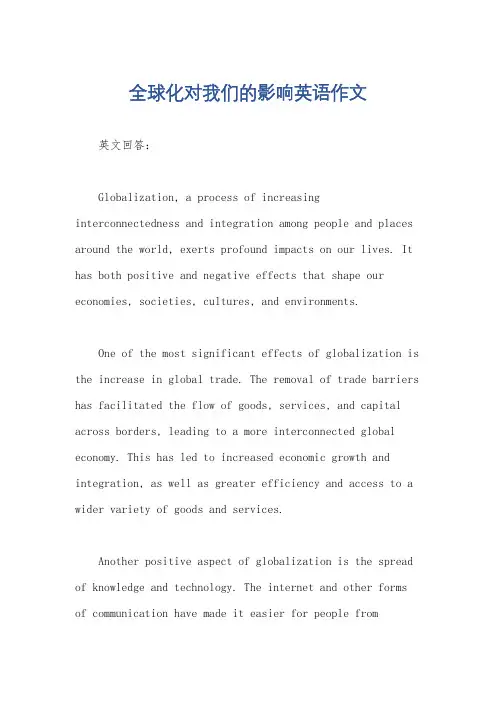
全球化对我们的影响英语作文英文回答:Globalization, a process of increasing interconnectedness and integration among people and places around the world, exerts profound impacts on our lives. It has both positive and negative effects that shape our economies, societies, cultures, and environments.One of the most significant effects of globalization is the increase in global trade. The removal of trade barriers has facilitated the flow of goods, services, and capital across borders, leading to a more interconnected global economy. This has led to increased economic growth and integration, as well as greater efficiency and access to a wider variety of goods and services.Another positive aspect of globalization is the spread of knowledge and technology. The internet and other forms of communication have made it easier for people fromdifferent cultures and backgrounds to connect, share ideas, and collaborate on projects. This has led to advancements in various fields, including science, medicine, and education.However, globalization also brings certain challenges. One major concern is the increasing inequality between developed and developing countries. While globalization has created wealth and opportunities in some regions, it has also exacerbated poverty and social inequality in others. The loss of jobs due to automation and the outsourcing of industries can have significant negative effects on local economies and communities.Another concern is the environmental impact of globalization. The increased production and consumption associated with global trade often puts a strain on natural resources and ecosystems. The transportation of goods over long distances can also contribute to air and water pollution.Furthermore, globalization can challenge culturalidentities and traditions. As different cultures come into contact, some local customs and practices may be eroded or replaced. While cultural exchange can be enriching, it is important to preserve and respect the diversity of cultural traditions around the world.中文回答:全球化是指全球范围内人员与地区之间联系和整合日益增多的过程,对我们的生活产生了深远的影响。
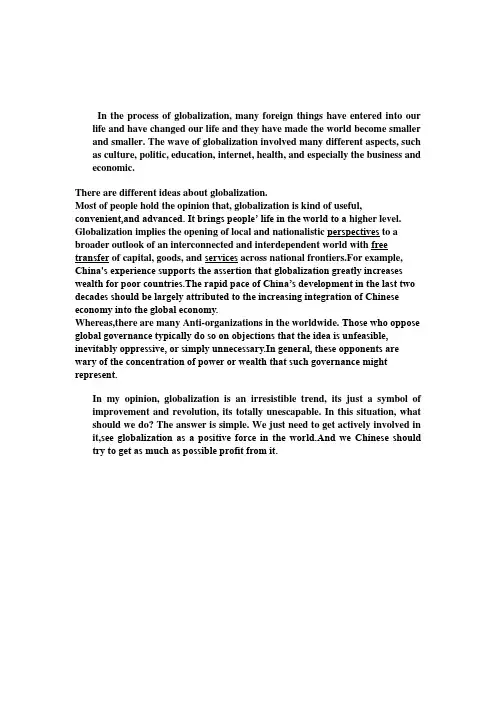
In the process of globalization, many foreign things have entered into our life and have changed our life and they have made the world become smaller and smaller. The wave of globalization involved many different aspects, such as culture, politic, education, internet, health, and especially the business and economic.There are different ideas about globalization.Most of people hold the opinion that, globalization is kind of useful, convenient,and advanced. It brings people’ life in the world to a higher level. Globalization implies the opening of local and nationalistic perspectives to a broader outlook of an interconnected and interdependent world with freetransfer of capital, goods, and services across national frontiers.For example,China's experience supports the assertion that globalization greatly increases wealth for poor countries.The rapid pace of China’s deve lopment in the last two decades should be largely attributed to the increasing integration of Chinese economy into the global economy.Whereas,there are many Anti-organizations in the worldwide.Those who oppose global governance typically do so on objections that the idea is unfeasible, inevitably oppressive, or simply unnecessary.In general, these opponents are wary of the concentration of power or wealth that such governance might represent.In my opinion, globalization is an irresistible trend, its just a symbol of improvement and revolution, its totally unescapable. In this situation, what should we do? The answer is simple. We just need to get actively involved in it,see globalization as a positive force in the world.And we Chinese should try to get as much as possible profit from it.。
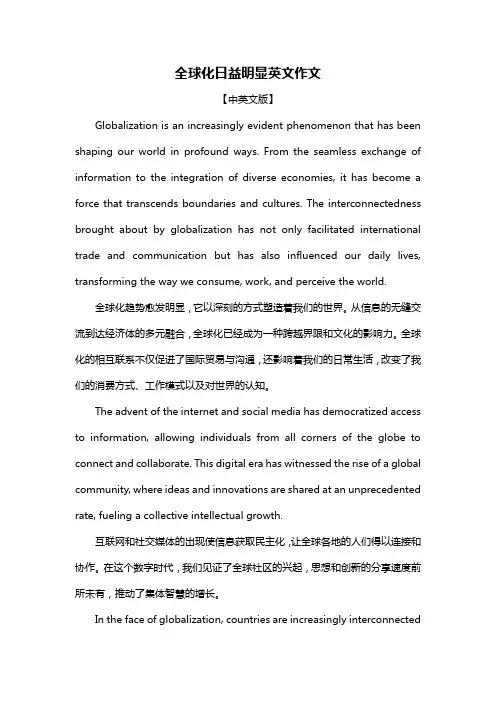
全球化日益明显英文作文【中英文版】Globalization is an increasingly evident phenomenon that has been shaping our world in profound ways. From the seamless exchange of information to the integration of diverse economies, it has become a force that transcends boundaries and cultures. The interconnectedness brought about by globalization has not only facilitated international trade and communication but has also influenced our daily lives, transforming the way we consume, work, and perceive the world.全球化趋势愈发明显,它以深刻的方式塑造着我们的世界。
从信息的无缝交流到达经济体的多元融合,全球化已经成为一种跨越界限和文化的影响力。
全球化的相互联系不仅促进了国际贸易与沟通,还影响着我们的日常生活,改变了我们的消费方式、工作模式以及对世界的认知。
The advent of the internet and social media has democratized access to information, allowing individuals from all corners of the globe to connect and collaborate. This digital era has witnessed the rise of a global community, where ideas and innovations are shared at an unprecedented rate, fueling a collective intellectual growth.互联网和社交媒体的出现使信息获取民主化,让全球各地的人们得以连接和协作。
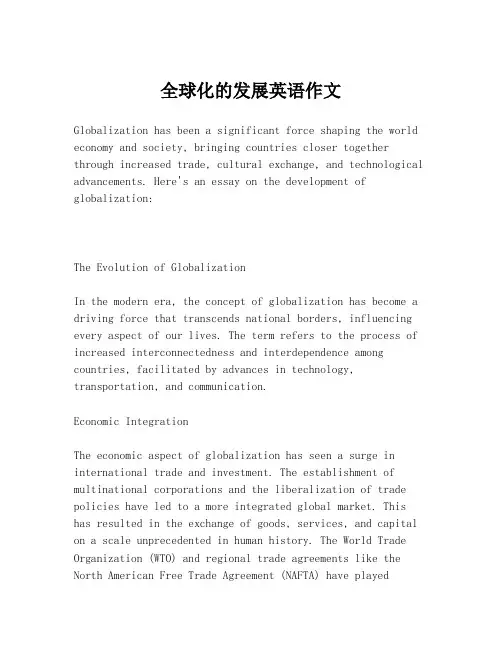
全球化的发展英语作文Globalization has been a significant force shaping the world economy and society, bringing countries closer together through increased trade, cultural exchange, and technological advancements. Here's an essay on the development of globalization:The Evolution of GlobalizationIn the modern era, the concept of globalization has become a driving force that transcends national borders, influencing every aspect of our lives. The term refers to the process of increased interconnectedness and interdependence among countries, facilitated by advances in technology, transportation, and communication.Economic IntegrationThe economic aspect of globalization has seen a surge in international trade and investment. The establishment of multinational corporations and the liberalization of trade policies have led to a more integrated global market. This has resulted in the exchange of goods, services, and capital on a scale unprecedented in human history. The World Trade Organization (WTO) and regional trade agreements like the North American Free Trade Agreement (NAFTA) have playedpivotal roles in this process.Cultural ExchangeCultural globalization has also been a defining feature of our times. The spread of mass media, the internet, and social media platforms has allowed for the rapid dissemination of cultural products and ideas. This has led to a blending of cultures, with people from different parts of the world being exposed to and influenced by various cultural practices and traditions.Technological AdvancementsTechnology has been the backbone of globalization, enabling instant communication and the seamless flow of information. The advent of the internet, smartphones, and other digital technologies has connected people in ways that were unimaginable a few decades ago. This has not only facilitated business transactions but also enabled social interactions across continents.Challenges and CritiquesDespite its many benefits, globalization has also faced criticism. Critics argue that it has led to job losses in developed countries due to outsourcing to cheaper labor markets. Additionally, there are concerns about cultural homogenization, where local cultures are overshadowed by global trends.Balancing ActThe key to successful globalization lies in striking a balance between economic growth and social equity. It requires policies that protect the interests of workers and the environment while promoting fair trade and sustainable development.ConclusionIn conclusion, globalization is a complex and multifaceted phenomenon that has transformed the world in profound ways. While it presents challenges, it also offers opportunities for growth and collaboration. As we move forward, it is essential to embrace globalization's potential while addressing its shortcomings to ensure a more equitable and prosperous global community.This essay provides a brief overview of globalization's impact on the economy, culture, and technology, and touches on the challenges and the need for a balanced approach.。
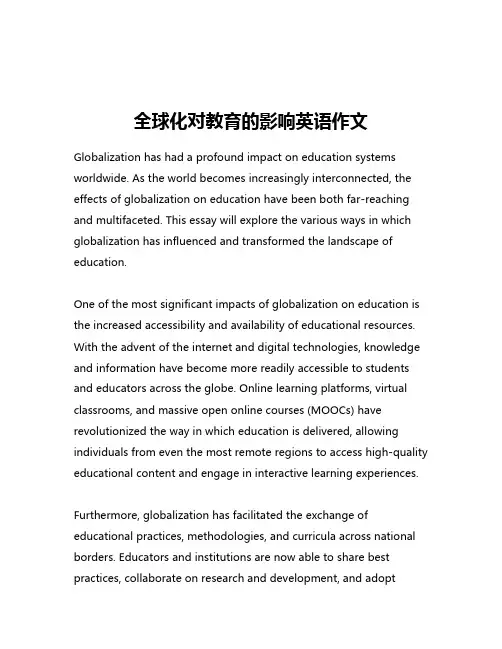
全球化对教育的影响英语作文Globalization has had a profound impact on education systems worldwide. As the world becomes increasingly interconnected, the effects of globalization on education have been both far-reaching and multifaceted. This essay will explore the various ways in which globalization has influenced and transformed the landscape of education.One of the most significant impacts of globalization on education is the increased accessibility and availability of educational resources. With the advent of the internet and digital technologies, knowledge and information have become more readily accessible to students and educators across the globe. Online learning platforms, virtual classrooms, and massive open online courses (MOOCs) have revolutionized the way in which education is delivered, allowing individuals from even the most remote regions to access high-quality educational content and engage in interactive learning experiences.Furthermore, globalization has facilitated the exchange of educational practices, methodologies, and curricula across national borders. Educators and institutions are now able to share best practices, collaborate on research and development, and adoptsuccessful educational models from other countries. This cross-pollination of ideas and approaches has led to the fostering of a more globally-informed and diverse educational landscape, where students are exposed to a wider range of perspectives and educational philosophies.The increased mobility of students and faculty members is another significant impact of globalization on education. With the availability of international exchange programs, study abroad opportunities, and collaborative research initiatives, students and educators are able to experience diverse educational systems and cultures firsthand. This exposure to different educational frameworks and cultural contexts not only broadens their intellectual horizons but also promotes the development of intercultural competencies, language skills, and a greater appreciation for diversity.Additionally, globalization has led to the emergence of international standards and benchmarking systems in education. Organizations such as the Organisation for Economic Co-operation and Development (OECD) and the Programme for International Student Assessment (PISA) have developed standardized assessments and performance indicators that allow for the comparison of educational outcomes across countries. While these global benchmarks have faced some criticism, they have also encouraged governments and educational institutions to strive for excellence and to adopt bestpractices from high-performing education systems.However, the impact of globalization on education is not without its challenges. The increasing emphasis on international competitiveness and the pressure to align with global standards can sometimes lead to the homogenization of educational systems, where local and contextual factors are overlooked in favor of a one-size-fits-all approach. This can result in the marginalization of indigenous knowledge, cultural diversity, and the unique educational needs of specific communities.Furthermore, the rapid pace of technological change and the demand for new skills in the global job market have put significant pressure on educational institutions to constantly update their curricula and teaching methodologies. Keeping up with the evolving skill requirements of the 21st-century workforce can be a daunting task, requiring substantial investments in teacher training, infrastructure, and educational innovation.Another concern is the potential widening of educational disparities within and across countries. Globalization has the capacity to amplify existing inequalities, as access to high-quality education and educational resources may still be unequal, particularly in developing countries or underprivileged communities. This can have far-reaching implications for social mobility, economic opportunity, and theoverall quality of life for individuals and communities.Despite these challenges, the overall impact of globalization on education has been largely positive. By fostering international collaboration, promoting the exchange of ideas and best practices, and expanding access to educational resources, globalization has the potential to improve the quality of education and create more equitable opportunities for learners around the world. As we navigate the ongoing transformation of education in the 21st century, it is crucial that we address the challenges posed by globalization while embracing its potential to create more inclusive, innovative, and globally-connected educational systems.。
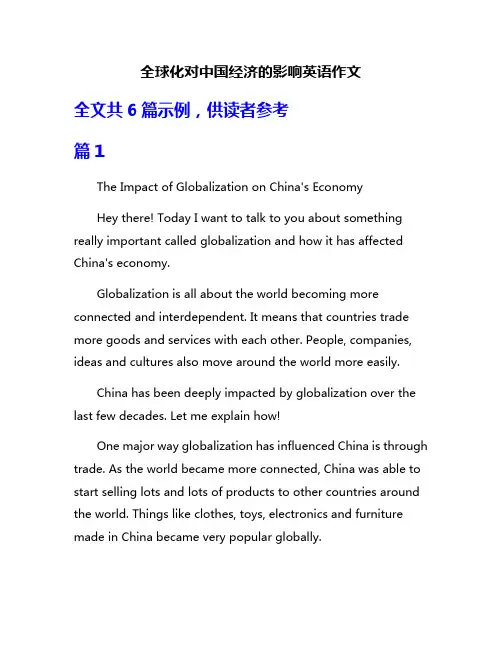
全球化对中国经济的影响英语作文全文共6篇示例,供读者参考篇1The Impact of Globalization on China's EconomyHey there! Today I want to talk to you about something really important called globalization and how it has affected China's economy.Globalization is all about the world becoming more connected and interdependent. It means that countries trade more goods and services with each other. People, companies, ideas and cultures also move around the world more easily.China has been deeply impacted by globalization over the last few decades. Let me explain how!One major way globalization has influenced China is through trade. As the world became more connected, China was able to start selling lots and lots of products to other countries around the world. Things like clothes, toys, electronics and furniture made in China became very popular globally.Countries like the United States, Canada, Japan and many European nations started importing huge amounts of goods from China. This allowed China's manufacturing industries to grow massively and hire millions of workers to make products for export.At the same time, China also started importing more goods from other countries to meet the demands of its own people. As Chinese families got richer from the booming export business, they could afford to buy more imported products like cars, smartphones, brand-name luxury items and more.So globalization really opened up China to much more international trade in both directions - allowing it to become a major exporting powerhouse while also buying goods from abroad. All this trade created tons of jobs and income in China.Another big impact of globalization was from foreign investment pouring into China. As the country opened up its markets, many multinational companies decided to build factories in China to take advantage of the low costs of labor and operations there.Companies like Apple, Nike, Toyota and hundreds more set up manufacturing plants across China. This foreign direct investment added even more fuel to China's economic boom bycreating infrastructure, bringing advanced technology, and hiring Chinese workers.At the same time, Chinese companies were also able to invest abroad in other countries, buying assets and expanding their reach globally as the world became more integrated through globalization.Globalization has helped integrate China into the global financial system as well. China trades its currency more freely, its companies are listed on international stock markets, and it has gained more influence over global banking and investment rules.All this integration into world trade, investment and finance has allowed China to rapidly develop its economy over the last few decades into the second largest in the world after the United States.Millions of people moved from rural areas to cities to work in factories and services businesses tied to globalization. Living standards improved dramatically for huge portions of the Chinese population that were able to benefit from the new jobs and opportunities.There were concerns about overdependence on exports to power the economy. Environmental damage was also a majorissue caused by rapid industrialization. And not everyone was able to share in the economic gains equally.But overall, globalization has been a tremendously transformative force that has remodeled China's economy and development path in an unprecedented way.China embraced globalization and was able to use it to integrate with the world economy, attract investment, develop industries, improve productivity, create jobs and increase incomes for its huge population base.Love it or hate it, there's just no denying how profoundly globalization has reshaped China into an economic powerhouse over the past few decades. It will be really fascinating to see how China's relationship with the global economy continues evolving in the years ahead.Well, that's my take on this big important topic! I hope it helped explain how much globalization has impacted China, making it one of the major players in the international economy these days. Let me know if you have any other questions!篇2The Impact of Globalization on China's EconomyHello, my name is Lily, and I'm a 10-year-old student from Beijing, China. Today, I want to talk to you about globalization and how it has affected my country's economy.Globalization is a big word that means different countries around the world are becoming more connected and dependent on each other. It's like a giant web where everything is linked together. When one part of the web moves, it affects the other parts too.China has been a part of this globalization process for many years now, and it has had a significant impact on our economy. Let me explain how.First, globalization has opened up new markets for Chinese products. In the past, Chinese companies mainly sold their goods within the country. But now, thanks to globalization, they can sell their products to people all over the world. This has been really good for our economy because it has created a lot of new jobs and brought in more money.For example, my uncle works in a factory that makes toys. His factory used to only sell toys in China, but now they sell them to countries like the United States, Canada, and even Australia! Isn't that amazing? Because of globalization, my uncle's factory has been able to grow and hire more workers.Second, globalization has brought in a lot of foreign investment to China. Foreign companies from places like the United States, Japan, and Europe have been building factories and offices in China. This has created even more jobs for Chinese people and has helped our economy grow.My mom's friend works for a big American company that makes computers. They have a huge factory in Shanghai, and they employ thousands of Chinese workers. Without globalization, this company might never have come to China, and all those jobs wouldn't exist.Third, globalization has helped China become more modern and advanced. We've been able to learn from other countries and adopt their technologies and ideas. This has made our industries more efficient and productive, which is good for our economy.For example, my dad works in a car factory that uses the latest robot technology from Germany. He says that these robots help them make cars faster and with fewer mistakes. This means they can produce more cars and sell them at a lower price, which makes their company more competitive in the global market.However, globalization hasn't been all good for China. There have been some challenges too.One problem is that some Chinese industries have struggled to compete with cheaper products from other countries. This has led to job losses and factory closures in certain sectors.My grandpa used to work in a textile factory that made clothes. But a few years ago, the factory had to shut down because they couldn't compete with cheaper clothes being imported from places like Vietnam and Bangladesh. It was really hard for my grandpa and his co-workers to find new jobs.Another issue is that globalization has led to more pollution and environmental problems in China. With all the new factories and industries, there has been a lot of air and water pollution. This has made some people sick and has caused damage to our natural environment.My aunt lives in a city with a lot of factories, and she says that the air is often really smoggy and hard to breathe. She worries about the long-term effects it might have on her health and the health of her children.Despite these challenges, I think globalization has been mostly good for China's economy. It has created a lot of new jobs and opportunities for people like my family members. It has also made China a more important player in the global economy, which is something we can be proud of.However, we do need to be careful and make sure that we protect our environment and take care of the workers who might be affected by globalization. We should also try to learn from other countries and adopt their best practices when it comes to things like worker rights and environmental protection.Overall, globalization has been a big part of China's economic growth and development over the past few decades. It has brought both benefits and challenges, but I think the benefits have been greater. As long as we manage it carefully and learn from our mistakes, globalization can continue to be a positive force for China's economy in the years to come.篇3The Impact of Globalization on China's EconomyGlobalization is a big word that means the world is becoming more connected and interdependent. It's like having friends from all over the world instead of just in your neighborhood! Globalization has significantly influenced China's economy, which is the way money and resources move around the country. Let me tell you about some of the critical impacts it has had.One of the most significant changes brought about by globalization is increased trade between China and other countries. In the past, China mainly traded within its borders, but now it exports (sells) and imports (buys) many goods internationally. For example, you may have toys, clothes, or electronics made in China at your home! China is a manufacturing powerhouse, producing vast quantities of products that get sold worldwide.This international trade has created countless jobs in China's factories, workshops, and ports. Millions of workers get employed making items for export. The money that other countries pay for Chinese goods provides income and improves living standards for many Chinese families. Pretty cool, right?At the same time, China also imports many things from abroad, like raw materials, technology, and specialized products. This allows Chinese companies to access resources and expertise that may be scarce or unavailable within the country. For instance, China buys a lot of iron ore, oil, and computer chips from other nations to fuel its industries and power its economy.Another way globalization impacts China is through foreign investment. Companies from overseas are attracted by China's large market and relatively low production costs. They buildfactories and offices in China, creating even more jobs. This foreign direct investment (FDI) has helped China's economy grow tremendously over the past few decades.However, with increased global integration come some challenges too. China faces intense competition from otherlow-cost manufacturing countries. There are also concerns about excessive reliance on exporting instead of developing robust domestic consumption. Environmental degradation caused by rapid industrialization is another significant issue China grapples with.Despite these challenges, globalization's overall impact on China's economy has been tremendously positive. It has transformed China from an impoverished and isolated nation into an economic powerhouse integrated with the rest of the world. Hundreds of millions of Chinese people have been lifted out of poverty thanks to the opportunities created by globalization.But there's no denying that globalization has been a driving force behind China's remarkable economic rise over the past few decades. The increased flow of goods, investment, and information across borders has reshaped China's economic landscape beyond recognition. While challenges remain,globalization has undoubtedly been a net positive for China's development and prosperity.So the next time you see a "Made in China" label, remember the fascinating story of how globalization has transformed that ancient nation into an economic giant deeply integrated with the entire world! China's embrace of globalization is an inspiring example of how breaking down barriers can uplift hundreds of millions of lives.篇4The Impact of Globalization on China's EconomyHello, my friends! Today, we're going to talk about something called "globalization" and how it has affected China's economy. Globalization is a big word, but it's not as scary as it sounds. It simply means that countries around the world are becoming more connected and interdependent.Let me start by explaining what an economy is. An economy is like a big, complicated game where people produce, buy, and sell goods and services. Every country has its own economy, and China's economy is one of the largest in the world.Now, let's talk about how globalization has impacted China's economy. Imagine a world where countries were like islands, with no bridges or boats connecting them. Each island would have to produce everything it needed on its own. But in today's globalized world, countries are like islands with bridges and ships that allow them to trade goods and services with each other.One of the biggest ways globalization has affected China's economy is through trade. China has become a major exporter of goods, which means it produces and sells products to other countries. Some of the things China exports include electronics, clothing, toys, and machinery.When other countries buy products from China, it brings money into China's economy. This money can be used to create more jobs, build more factories, and make more products. It's like a big cycle that keeps going round and round.But globalization hasn't just been about exporting goods. It has also allowed foreign companies to invest in China and set up businesses there. These foreign companies bring money, technology, and new ideas to China, which helps the economy grow even more.Another way globalization has impacted China's economy is through the movement of people. Many Chinese workers have gone to other countries to find jobs, and they send money back home to their families in China. This money helps support their families and contributes to China's economy.At the same time, foreigners have come to China to work and study, bringing their skills, knowledge, and different perspectives. This cultural exchange has helped China become more connected to the rest of the world.Additionally, as China's economy grows and becomes more integrated with the global economy, it can be affected by events happening in other parts of the world, such as economic crises or political tensions.Despite these challenges, most experts agree that globalization has been a positive force for China's economy overall. It has helped lift millions of people out of poverty and has turned China into a major player on the global economic stage.As you can see, globalization is a complex topic with both benefits and challenges for China's economy. But one thing is certain: in today's interconnected world, what happens in onepart of the globe can have ripple effects on the other side of the planet.So, the next time you see a "Made in China" label on a toy or an electronic device, remember that it's a symbol of how globalization has brought countries closer together, for better or for worse. And who knows, maybe one day you'll be part of this global economy, trading goods and services with people from all around the world!篇5The Big World Gets Smaller: How Globalization Affects ChinaHave you ever wondered why you can buy toys, clothes, and even food from so many different countries? It's all because of something called globalization. Let me tell you what that means and how it impacts China's economy.Globalization is when countries around the world become more connected and start working together. It's like having friends from different neighborhoods coming over to play in your backyard. With globalization, people, products, money, and ideas can move much more easily across borders.One big part of globalization is international trade. That's when countries buy and sell things from each other. China trades a lot with other nations. If you look around your home, you'll probably find many items that were made in China. At the same time, China buys oil, computers, airplanes and lots of other products from places like the United States, Japan, and Germany.Why does China trade so much? Well, imagine if every family had to grow their own food, make their own clothes, build their own house, and create absolutely everything they need. That would be really hard work! Trade allows each place to focus on making the things they're best at, and then swap those for the things they need from elsewhere. It makes life much easier for everyone.For example, China is really good at manufacturing, which means making products efficiently in large factories. So China makes toys, electronics, clothes and many other affordable products that get sold all over the world. In exchange, China can buy raw materials like oil and minerals, advanced machines, and services like engineering expertise from other countries. It's a win-win!Having an economy that trades a lot has helped make China richer and more developed over the past few decades. Millionsof people moved from farms to cities to work in factories and other globalized businesses. More trade means more jobs and income for Chinese families. Globalization also brought new knowledge, technologies and ideas into China from abroad.However, all this globalization and rapid growth has also created some challenges for China:Sometimes the air gets very polluted from all the factories.There's more traffic jams and crowding in the big cities people move to for jobs.Some small businesses couldn't compete with cheaper imported products.Workers sometimes have to put in very long hours at factories.So while globalization brought China incredible economic progress, there are also important environmental and social costs to consider going forward.Looking ahead, China is trying to strike a better balance. The government wants higher-paying jobs in technology and banking rather than just low-cost manufacturing. They're investing billions to build cities with better public transit, parks,and affordable housing. Laws are getting stricter on pollution and worker rights too.At the same time, China is becoming an inventor and exporter of its own technologies like high-speed trains, renewable energy and digital payment systems. The world's biggest movie theaters, shopping malls and mobile games are Chinese brands now.As China grows richer from globalization, its people can afford to buy more products from abroad as well. That creates business opportunities not just for Chinese companies, but international brands and entrepreneurs too.In many ways, the future economy is becoming even more globalized and interconnected. Ideas, cultures, tourism and investments flow rapidly around the world along with trade. An entrepreneur in Beijing can collaborate with partners in Silicon Valley and raise money from investors in London, all thanks to globalization.So while globalization brings incredible progress and opportunity, we have to be careful to address its costs and make it more balanced, ethical and sustainable going forward. The world is an amazingly small place now. What happens on one side of the planet affects us all. We're all in this together!篇6The Globalization Effect: How the World is Changing China's EconomyHello, friends! Today, we're going to talk about something really important – globalization and how it's affecting China's economy. Globalization is a big word, but it simply means that the world is becoming more connected. Countries are trading goods, services, and ideas with each other more than ever before.China's economy has been growing rapidly in recent years, and globalization is one of the main reasons behind this growth. Let me explain how.Firstly, globalization has opened up new markets for Chinese products. In the past, Chinese companies mainly sold their goods within China. But now, thanks to globalization, they can sell their products all over the world. Countries like the United States, Japan, and Germany are buying a lot of Chinese-made goods, such as electronics, toys, and clothing.This has been great for China's economy because it has created lots of jobs in factories and businesses that makeproducts for export. More jobs mean more people have money to spend, which helps the economy grow even more.Secondly, globalization has brought in foreign investment to China. Many companies from other countries have set up factories and offices in China. This investment has created even more jobs and has helped China develop new technologies and industries.For example, companies like Apple, Samsung, and Toyota have built factories in China to make their products. These companies have brought in money, skills, and knowledge that have helped China's economy become more advanced.Thirdly, globalization has helped China learn from other countries. Chinese businesses and workers have been able to visit other countries and see how they do things. They've learned new ways of working, new management techniques, and new technologies. This has made Chinese companies more efficient and competitive in the global market.However, globalization has also brought some challenges for China's economy. One challenge is that some Chinese industries have struggled to compete with cheaper products from other countries. This has led to job losses in some sectors, which can be difficult for workers and their families.Another challenge is that globalization has caused some environmental problems in China. With so many factories and businesses, there has been more pollution and damage to the environment. The Chinese government is working hard to address these issues, but it's not always easy.Despite these challenges, most experts agree that globalization has been good for China's economy overall. It has helped create millions of new jobs, brought in valuable investment and knowledge, and allowed Chinese companies to sell their products all over the world.As China's economy continues to grow and become more connected to the global economy, it will be important to manage the challenges of globalization while taking advantage of the opportunities it offers.So, there you have it, friends! Globalization has had a big impact on China's economy, bringing both benefits and challenges. It's an important topic that affects all of us, and it's worth learning more about as we grow older.。
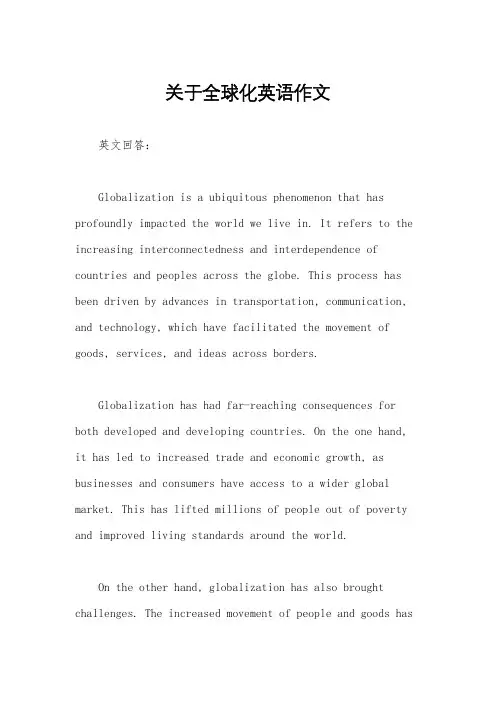
关于全球化英语作文英文回答:Globalization is a ubiquitous phenomenon that has profoundly impacted the world we live in. It refers to the increasing interconnectedness and interdependence of countries and peoples across the globe. This process has been driven by advances in transportation, communication, and technology, which have facilitated the movement of goods, services, and ideas across borders.Globalization has had far-reaching consequences for both developed and developing countries. On the one hand, it has led to increased trade and economic growth, as businesses and consumers have access to a wider global market. This has lifted millions of people out of poverty and improved living standards around the world.On the other hand, globalization has also brought challenges. The increased movement of people and goods hasfacilitated the spread of diseases and environmental degradation. Additionally, the concentration of power inthe hands of multinational corporations has raised concerns about inequality and the erosion of national sovereignty.In light of these complex effects, it is important for us to engage in a critical and nuanced discussion about globalization. We need to recognize both the benefits and challenges that it brings, and work together to create a more equitable and sustainable globalized world.中文回答:全球化是一种普遍现象,它对我们所生活的这个世界产生了深远的影响。
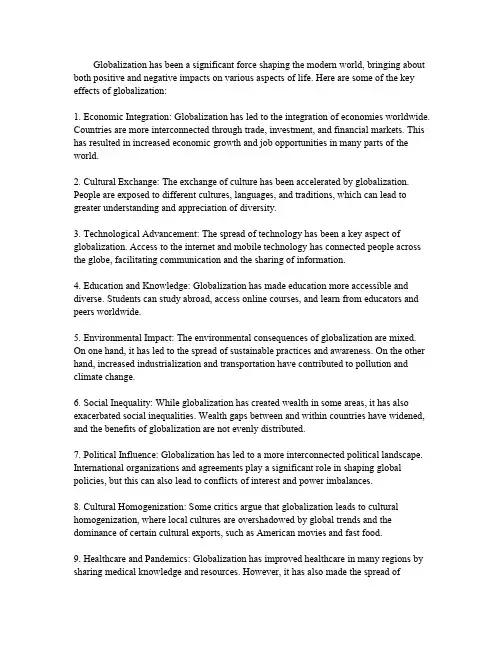
Globalization has been a significant force shaping the modern world,bringing about both positive and negative impacts on various aspects of life.Here are some of the key effects of globalization:1.Economic Integration:Globalization has led to the integration of economies worldwide. Countries are more interconnected through trade,investment,and financial markets.This has resulted in increased economic growth and job opportunities in many parts of the world.2.Cultural Exchange:The exchange of culture has been accelerated by globalization. People are exposed to different cultures,languages,and traditions,which can lead to greater understanding and appreciation of diversity.3.Technological Advancement:The spread of technology has been a key aspect of globalization.Access to the internet and mobile technology has connected people across the globe,facilitating communication and the sharing of information.cation and Knowledge:Globalization has made education more accessible and diverse.Students can study abroad,access online courses,and learn from educators and peers worldwide.5.Environmental Impact:The environmental consequences of globalization are mixed. On one hand,it has led to the spread of sustainable practices and awareness.On the other hand,increased industrialization and transportation have contributed to pollution and climate change.6.Social Inequality:While globalization has created wealth in some areas,it has also exacerbated social inequalities.Wealth gaps between and within countries have widened, and the benefits of globalization are not evenly distributed.7.Political Influence:Globalization has led to a more interconnected political landscape. International organizations and agreements play a significant role in shaping global policies,but this can also lead to conflicts of interest and power imbalances.8.Cultural Homogenization:Some critics argue that globalization leads to cultural homogenization,where local cultures are overshadowed by global trends and the dominance of certain cultural exports,such as American movies and fast food.9.Healthcare and Pandemics:Globalization has improved healthcare in many regions by sharing medical knowledge and resources.However,it has also made the spread ofdiseases like COVID19more rapid and widespread.10.Migration and Labor:The movement of people across borders has increased due to globalization.This has led to a more diverse workforce but also to debates about immigration policies and the rights of migrant workers.In conclusion,globalization is a complex phenomenon with farreaching implications.It offers opportunities for growth and cultural exchange but also presents challenges that need to be managed to ensure equitable outcomes for all.。
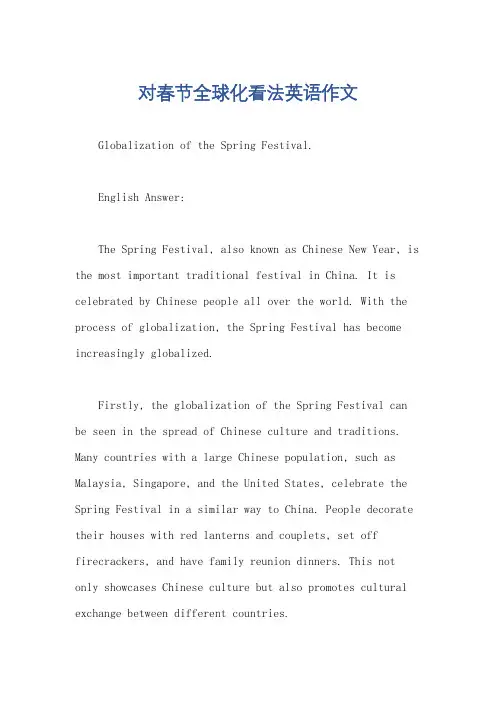
对春节全球化看法英语作文Globalization of the Spring Festival.English Answer:The Spring Festival, also known as Chinese New Year, is the most important traditional festival in China. It is celebrated by Chinese people all over the world. With the process of globalization, the Spring Festival has become increasingly globalized.Firstly, the globalization of the Spring Festival can be seen in the spread of Chinese culture and traditions. Many countries with a large Chinese population, such as Malaysia, Singapore, and the United States, celebrate the Spring Festival in a similar way to China. People decorate their houses with red lanterns and couplets, set off firecrackers, and have family reunion dinners. This not only showcases Chinese culture but also promotes cultural exchange between different countries.Secondly, the globalization of the Spring Festival is evident in the increasing number of non-Chinese people participating in the celebrations. As Chinese culture gains popularity worldwide, more and more people are becoming interested in the Spring Festival. For example, in London, there is an annual Chinese New Year parade that attracts thousands of non-Chinese spectators. This shows that the Spring Festival is not only a Chinese tradition but also a global cultural event.Furthermore, the globalization of the Spring Festival can be seen in the commercialization of traditional customs. Many businesses seize the opportunity to promote their products during the Spring Festival. For instance, luxury brands release limited edition products featuring Chinese zodiac animals, and restaurants offer special SpringFestival menus. This not only boosts the economy but also adds a modern touch to traditional celebrations.In conclusion, the Spring Festival has become increasingly globalized due to the spread of Chineseculture, the participation of non-Chinese people, and the commercialization of traditional customs. It is a festival that not only brings Chinese people together but also promotes cultural exchange and economic development worldwide.中文回答:春节,也被称为中国新年,是中国最重要的传统节日。
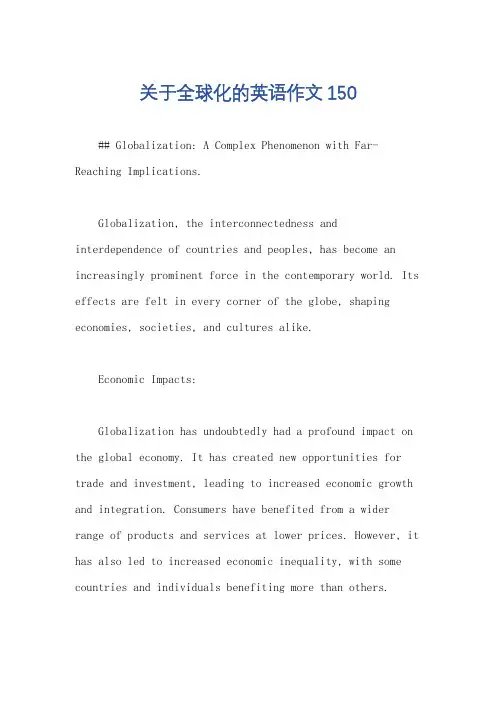
关于全球化的英语作文150## Globalization: A Complex Phenomenon with Far-Reaching Implications.Globalization, the interconnectedness and interdependence of countries and peoples, has become an increasingly prominent force in the contemporary world. Its effects are felt in every corner of the globe, shaping economies, societies, and cultures alike.Economic Impacts:Globalization has undoubtedly had a profound impact on the global economy. It has created new opportunities for trade and investment, leading to increased economic growth and integration. Consumers have benefited from a wider range of products and services at lower prices. However, it has also led to increased economic inequality, with some countries and individuals benefiting more than others.Social Impacts:Globalization has also had a significant impact on societies. It has facilitated the movement of people, ideas, and cultures across borders. This has enriched our understanding of the world and increased our interconnectedness. However, it has also posed challengesto national identities and traditions and has led to increased social inequality.Environmental Impacts:Globalization has had both positive and negativeeffects on the environment. On the one hand, it has facilitated the spread of sustainable technologies and practices. On the other hand, it has also led to increased resource consumption, pollution, and greenhouse gas emissions. Striking a balance between economic development and environmental protection is crucial for ensuring a sustainable future.Political Impacts:Globalization has also had political implications. It has created a more interdependent world, which has made international cooperation and collaboration essential. However, it has also led to increased tensions andconflicts between countries, as they compete for resources and markets.Cultural Impacts:Globalization has facilitated the exchange of ideas and cultures across borders. This has led to increased cultural diversity and innovation. However, it has also raised concerns about the loss of traditional cultures and the homogenization of global culture.Conclusion:Globalization is a complex and multifaceted phenomenon that has had profound impacts on economies, societies, cultures, and the environment. It has created both opportunities and challenges, and it is essential to manageits effects in a way that promotes sustainable development, equity, and global cooperation.---。
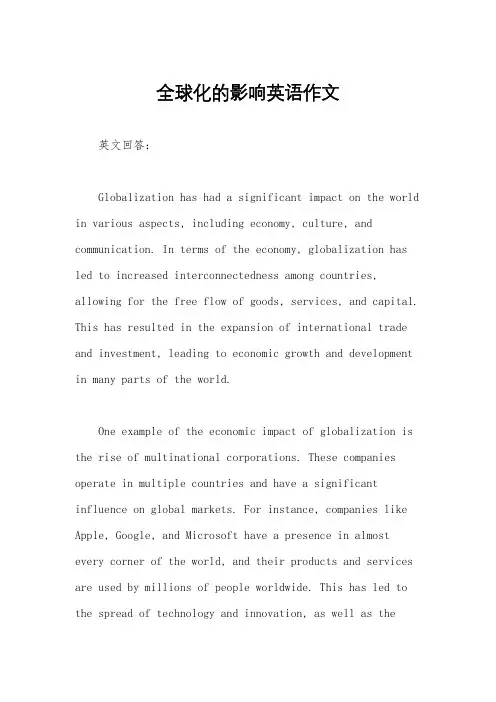
全球化的影响英语作文英文回答:Globalization has had a significant impact on the world in various aspects, including economy, culture, and communication. In terms of the economy, globalization has led to increased interconnectedness among countries, allowing for the free flow of goods, services, and capital. This has resulted in the expansion of international trade and investment, leading to economic growth and development in many parts of the world.One example of the economic impact of globalization is the rise of multinational corporations. These companies operate in multiple countries and have a significant influence on global markets. For instance, companies like Apple, Google, and Microsoft have a presence in almost every corner of the world, and their products and services are used by millions of people worldwide. This has led to the spread of technology and innovation, as well as thecreation of job opportunities in different countries.In terms of culture, globalization has led to the exchange and spread of cultural practices, beliefs, and values. This can be seen in the global popularity of music, movies, and fashion from different parts of the world. For example, K-pop from South Korea and Bollywood movies from India have gained international recognition and have fans from various countries. This has led to a greater appreciation and understanding of different cultures andhas contributed to the diversity of cultural expressions worldwide.Another impact of globalization is the ease of communication and information exchange. With the advent of the internet and social media, people can now connect with others from different parts of the world instantly. Thishas led to the sharing of ideas, knowledge, and experiences, and has facilitated cross-cultural understanding and collaboration. For example, I have friends from different countries whom I met online, and we are able to share our experiences and learn from each other despite beingthousands of miles apart.中文回答:全球化对世界各个方面产生了重大影响,包括经济、文化和交流等。
全球化的利弊英语作文篇一:全球化的英语作文Globalization and Internet (全球化/Internet)The drawing vividly unfolds …(Describe the picture描述图画)This phenomenon which this picture points out is one of numerous international phenomena to have become common and already attracted broad attention in the world in recent years. Globalization/Internet, in brief, makes the whole world a small village. Globalization/Internet offers extensive opportunities for every country in the world to develop their economy, improve their regime, eich their culture, update their technology and so forth, butglobalization/Internet is a two-edged sword: it can bring bothbenefit and harm. (Present state/situation现象描述+ /Meaning含义)这幅图画指出的这个现象是近几年在世界上众多已经变得普遍并且已经引起了广泛关注的国际/世界现象之一。
全球化/Internet,简言之,就是使整个世界变成一个小村子。
全球化/Internet给予了这个世界上的每一个国家广泛的机会去发展它们的经济、改善它们的政体、丰富它们的文化、更新它们的技术等等,但全球化/Internet是一把两刃剑:既有利的一面,也有害的一面。
Globalization
With the rapid social and economic development, globalization comes not to
be an unfamiliar word to all of us. Though we are living in the affection of it, yet
it is hard to tell it’s advantages and disadvantages.
Globalization phenomenon is an outcome of social development. The typical
types are economic globalization, cultural globalization. As we all know, it is a
double-edged sword. Therefore, we must pay more attention on this phenomenon
and it’s development trend.
Globalization has so many advantages, such as it makes the world become a
small village and let people touch each other more convenient and easy, it
increase free trade between nations and give the developing countries a terrific
opportunity to develop themselves in all aspects quickly. What’s more, it can
reduce the cultural barriers and let various of cultural get a better
communication and development. On the contrary, it also has a lot of
disadvantages. Because under globalization, every country’s economy can make
a great influence of others, it make the economy of the world more fragile. In
order to possess the good chance and precious resources, the disputes and even
wars may take place between nations. In recent years, great risk of diseases being
transported between nations has also become a threaten to people.
As the globalization has become an irrevocable trend, we must adjust it.
This phenomenon is an opportunity as well as a challenge. Consequently, every
person, every nation should try the best to get a good position in the process of
globalization and make full use of such a vital chance to be stronger.